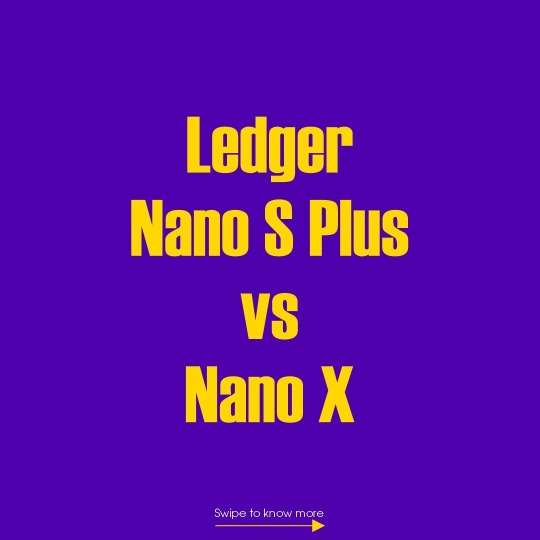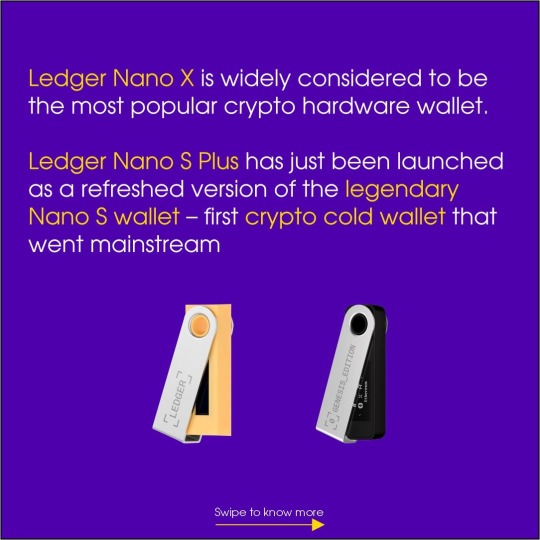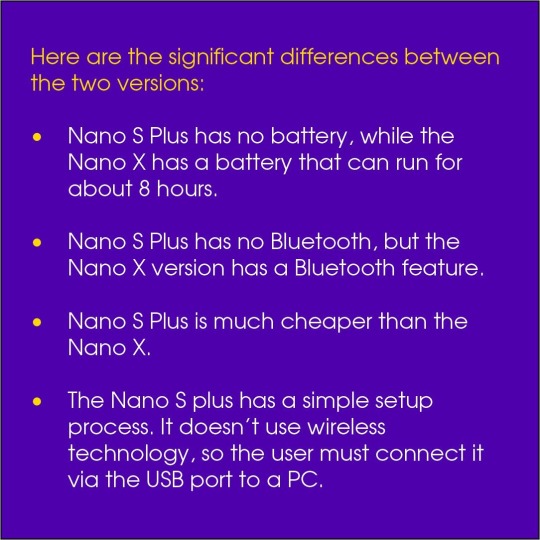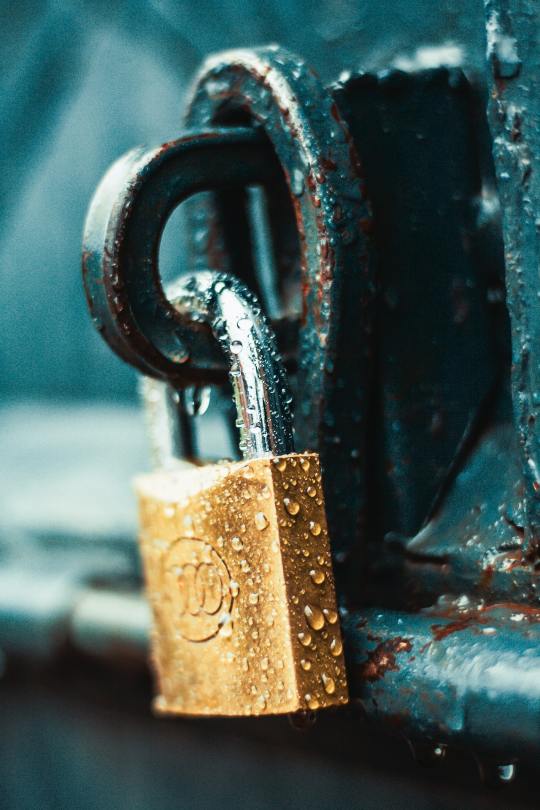#hardwarewallets
Text
🔒💰 Securing Your Cryptocurrency: Safely Transfer to a Hardware Wallet! 💰🔒
If you're venturing into the exciting world of cryptocurrencies, ensuring the safety of your digital assets is of utmost importance. When moving your precious coins from an exchange to a hardware wallet, you want to be extra cautious. Here are some essential security practices to follow for a safe and worry-free transfer:
1. Choose a Reputable Hardware Wallet: Your journey to safety starts with selecting a trustworthy hardware wallet from a reputable manufacturer. Do your research, read reviews, and make sure you're getting a genuine device.
2. Backup Your Wallet: Before you make the big move, don't forget to back up your hardware wallet's recovery seed or private keys. Jot down this valuable information on a physical paper and store it securely in multiple places like a safe or a safety deposit box.
3. Verify the Receiving Address: Double-check the receiving address displayed on your hardware wallet's screen to match the one provided by the wallet software or app. Avoid copy-pasting addresses to steer clear of clipboard hijacking malware.
4. Test with a Small Amount: Don't dive into the deep end right away. Send a small amount of cryptocurrency to your hardware wallet first to ensure everything works smoothly.
5. Keep Your System Secure: Keep your computer and devices malware-free. Utilize a reliable antivirus software and keep your operating system and software up to date.
6. Enable 2FA (Two-Factor Authentication): Strengthen your account's security by enabling 2FA on both the exchange and your hardware wallet if available.
7. Withdrawal Whitelisting (If Available): Some exchanges offer the option to whitelist withdrawal addresses. Make use of this feature and add your hardware wallet's address to allow secure transactions only to that address.
8. Double-check Network Fees: Be aware of the transaction fees associated with the transfer. Keep an eye out for high withdrawal fees from exchanges.
9. Confirm Transaction Details: Review all transaction details meticulously before confirming the withdrawal. Ensure the recipient address, amount, and other details are accurate.
10. Keep Your Hardware Wallet Secure: Once the funds are transferred, treat your hardware wallet like a treasure. Store it in a safe and secure location to protect it from any physical threats.
11. Keep Private Keys Offline: Keep your private keys far away from the online world. Avoid storing them on your computer or any online platform. Keep them offline, preferably on a hardware device like a Ledger or Trezor.
By following these steps, you can significantly minimize the risk of losing your precious cryptocurrency coins during the transfer process. Remember, when it comes to your digital assets, security should always be your top priority. Stay safe and enjoy your journey into the fascinating world of cryptocurrencies! 🚀💪
#CryptocurrencySecurity#HardwareWallets#CryptoSafety#SecureTransfers#ReputableWallets#BackupYourWallet#VerifyReceivingAddress#TestSmallAmountFirst#SecureYourSystem#Enable2FA#WhitelistingWithdrawals#DoubleCheckTransactionDetails#KeepHardwareWalletSecure#OfflinePrivateKeys#CryptoBestPractices
0 notes
Text
0 notes
Text
#kriptoparacüzdanı#kriptoparacüzdanları#kriptoparacüzdanınedir#kriptoparacüzdanıneişeyarar#kriptoparacüzdanıçeşitleri#coldwallets#yazılımcüzdanları#donanımcüzdanları#softwarewallets#hardwarewallets#paperwallets#kriptocüzdanı
0 notes
Video
youtube
"Stax is Hotter Than Expected: Get Ready to Preorder the New Ledger Stax...
Direct to Stax (went from presale to unavailable, check it out they may not be in stock until Summer). If you're looking for a secure way to store your cryptocurrency assets, you might want to consider Ledger Stax. As a well-known brand in the crypto world, Ledger is known for its high level of security. With Ledger Stax, you can store your assets in a hardware wallet, which provides an extra layer of protection against potential hacks or cyber-attacks. One of the great things about Ledger Stax is that it's designed to be user-friendly, even for beginners. The hardware wallet comes with a simple interface that makes it easy to manage your crypto assets and execute transactions. Plus, Ledger Stax is compatible with a wide range of cryptocurrencies, including Bitcoin, Ethereum, and many more. If you're interested in purchasing Ledger Stax, it's currently available for pre-order. This can help ensure that you get your device before it's released to the public, especially if there's high demand for it. Overall, Ledger Stax is a versatile and secure option for storing your cryptocurrency assets. If you want to learn more about it, be sure to check out our video on YouTube, where we provide a detailed review and walk-through of the product. Don't forget to like, comment, and subscribe to our channel for more great crypto content!
Stax on Ledger Store
#ledger#stax#hardwarewallet#cryptosecurity#bitcoin#ethereum#cryptocurrency#cold storage#cyber security#preorder#investment#digital asset#secure
3 notes
·
View notes
Video
youtube
🇺🇦 7+ порад. Як не втратити всю свою крипту! MetaMask безпека
#youtube#metamask metamasktutorial metamaskchrome security метамаск безпека smartcontracts hardwarewallet btc eth seedphrase
0 notes
Link
If you're looking to protect your bitcoin and other digital assets, cold storage is a great option. Cold storage refers to keeping your cryptocurrency offline, as opposed to hot storage, which keeps it online. By moving your bitcoin to an offline wallet, you can ensure that it's safe from hackers and other forms of cyberattacks. This is especially important if you're holding a large amount of bitcoin, or if you're using it as an investment. You can opt for a hardware wallet, which is a physical device that stores your bitcoin, or you can use a paper wallet, which is simply a printed-out record of your public and private keys. Both methods are reliable and secure, and they're great for long-term storage. Cold storage can be complicated to set up, but it's well worth the effort if you want to protect your assets. Learn how to keep your Bitcoin wallet safe and secure with this guide on cold storage.
#batteryeater#amazon#sales#bestdeals#reviews#deals#bitcoinwalletcoldstorage#hardwarewallet#besthardwarewallet
0 notes
Text
How To Store Your Crypto
If you have been in the crypto game for awhile now, you know that there are several different ways to store your crypto. You can buy a hardware wallet or you can use a software wallet. There are also services that allow you to hold your crypto online. This article will discuss how to use your crypto wallet and what to look for when selecting one.
There are many types of wallets available today. The first type of wallet is the hardware wallet. These are devices that you physically own. They are usually very small and come in the form of USB drives or cards. Some of these devices can be used to store bitcoin, ether, and other cryptos. These devices provide an easy way to store your crypto. The only downside to using a hardware wallet is that you must always have it with you. If you lose it, you will lose all of your crypto.
Another type of wallet is the software wallet. These wallets are software programs that run on your computer. They allow you to store your crypto offline. In order to use these wallets, you must download the software onto your computer. Then you can open it up and begin storing your crypto. The advantage of this method is that you do not have to carry around any physical device. However, if your computer crashes or is lost, you will lose your crypto.
A third type of wallet is the online wallet. These are websites that allow you to store your crypto online. When you use these sites, you do not need to download anything onto your computer. All you need is an internet connection and you can begin storing your crypto. The disadvantage of using an online wallet is that you will need to pay fees in order to store your crypto. Fees vary depending on the service you choose. You should read reviews and check out customer feedback before choosing which wallet you want to use.
https://popscrypto.com/index.php/2022/11/23/how-to-store-your-crypto/
0 notes
Photo



Difference Ledger Nano S Plus vs Nano X Wallet
#wallet #ledger #nano #nanox #crypto #nft #app #hardwarewallet #web
0 notes
Text
Cryptocurrency Wallet Security: Best Practices for Safeguarding Your Assets

In the digital age, securing your cryptocurrency wallet has become paramount. With the rising popularity of cryptocurrencies and the increasing frequency of wallet hacks and thefts, it is crucial to understand and implement best practices for safeguarding your assets. This article aims to provide a comprehensive guide to cryptocurrency wallet security, offering valuable insights and practical tips to protect your investments.
I. What is a Cryptocurrency Wallet?
1. Definition and Functionality
A cryptocurrency wallet is a digital tool that allows users to store, manage, and transfer their cryptocurrencies securely. Unlike traditional wallets, cryptocurrency wallets do not store physical currencies. Instead, they store private keys, which are essential for accessing and managing your digital assets on the blockchain.
2. Different Types of Cryptocurrency Wallets
When it comes to cryptocurrency wallets, you have several options to choose from, each with its own benefits and security considerations.
a. Hardware Wallets
Hardware wallets are physical devices designed to store your private keys offline. They provide an additional layer of security by keeping your keys disconnected from the internet, reducing the risk of malware attacks. Popular hardware wallets include Trezor and Ledger.
b. Software Wallets
Software wallets, also known as digital wallets or online wallets, are applications or programs that can be installed on your computer or mobile device. They provide a convenient way to access your cryptocurrencies but may be more vulnerable to hacking risks.
c. Paper Wallets
A paper wallet is a physical printout or handwritten document that contains the public and private keys of your cryptocurrency wallet. This type of wallet is considered highly secure as it is kept offline, away from potential online threats. However, it requires careful handling and safe storage practices.
II. Common Security Threats in Cryptocurrency Wallets
1. Potential Risks and Vulnerabilities
Cryptocurrency wallets face various security threats that users should be aware of. Understanding these risks can help you adopt the necessary precautions to safeguard your assets effectively.
2. Wallet Hacks and thefts
Wallet hacks, often resulting from negligence or weak security practices, can lead to the loss of your cryptocurrencies. Cybercriminals exploit vulnerabilities in the wallet software or the user's system to gain unauthorized access and steal funds.
3. Phishing Attacks
Phishing attacks involve the use of fraudulent websites, emails, or messages that imitate legitimate platforms to deceive users into revealing their private keys or other sensitive information. Falling victim to phishing can have severe consequences, including the loss of your cryptocurrencies.
4. Malware and Keyloggers
Malware and keyloggers are malicious programs that can infect your computer or mobile device, aiming to steal your wallet's private keys or login credentials. These stealthy threats can compromise your wallet's security if proper precautions are not taken.
5. Social Engineering Attacks
Social engineering attacks target individuals rather than technology. Cybercriminals use psychological manipulation techniques, such as impersonation or tricking users into revealing their private keys or performing unauthorized transactions.
III. Best Practices for Creating a Secure Cryptocurrency Wallet
A. Selecting the Right Wallet
Choosing the right wallet is crucial to ensure the security of your cryptocurrencies. Consider the following factors when selecting a wallet for maximum protection:
Factors to Consider
Wallet Types and Features: Understand the different types of wallets and the security features they offer. Assess which types align with your security preferences.
Reputation and Community Trust: Research the wallet's reputation and user reviews to gauge its trustworthiness.
Development and Update Frequency: Choose wallets with active development teams that regularly release updates and security patches to address vulnerabilities.
B. Set up and Installation
Proper setup and installation are fundamental to establishing a secure cryptocurrency wallet. Follow these steps to minimize the risk of compromise:
a. Obtaining Wallet Software
Download wallet software only from official sources or trusted platforms. Be cautious of third-party websites or links that may distribute malicious software.
b. Verifying Authenticity
Verify the authenticity of the wallet software by comparing digital signatures provided by the wallet developers. This ensures that the downloaded software has not been tampered with.
c. Installation and Configuration Steps
Carefully follow the installation and configuration instructions provided by the wallet developers. Pay attention to any recommended security settings.
C. Securing Your Wallet
Implementing robust security measures is crucial to protect your wallet from unauthorized access and potential theft. Consider the following best practices:
a. Strong Passwords and Encryption
Create strong, unique passwords for your wallet and avoid using easily guessable information. Enable encryption features offered by the wallet software for an additional layer of protection.
b. Two-Factor Authentication (2FA)
Enable two-factor authentication whenever possible. This adds an extra authentication step, ensuring that only authorized individuals can access your wallet.
c. Multi-Signature Functionality
Consider using wallets that support multi-signature functionality. This requires multiple authorized signatures to complete transactions, reducing the risk of unauthorized activity.
d. Cold Storage Alternatives
Explore cold storage options like hardware wallets or paper wallets. Keeping your private keys offline significantly reduces exposure to online threats.
e. Backup and Recovery Procedures
Regularly back up your wallet's private keys or recovery phrases. Store them securely in multiple locations, such as encrypted cloud storage or physical offline backups.
D. Keeping Your Wallet Safe Online
Maintaining adequate online security practices is vital to mitigate the risk of wallet compromise. Follow these guidelines for a safer online experience:
a. Safe Internet Browsing
Avoid visiting suspicious websites or clicking on unknown links. Be wary of phishing attempts and only visit secure websites (HTTPS) when interacting with your wallet.
b. Recognizing and Avoiding Phishing Attempts
Be vigilant about phishing attempts and avoid sharing your private keys or other sensitive information with anyone or any platform that requests it unexpectedly.
c. Regularly Updating Software and Plugins
Keep your wallet software and any associated plugins or extensions up to date. Software updates often include critical security patches that protect against known vulnerabilities.
d. Utilizing Firewall and Antivirus Software
Install and regularly update reliable firewall and antivirus software to add an extra layer of protection against malware and other online threats.
E. Protecting Your Wallet Offline
Physical security is also essential in ensuring the safety of your cryptocurrency wallet. Consider the following offline security measures:
a. Physical Security Considerations
Keep your physical wallet devices, such as hardware wallets, in a safe and secure location, away from potential theft or damage.
b. Secure USB and External Hard Drives
If you use portable storage devices to store wallet backups or private keys, encrypt them and keep them in a secure location when not in use.
c. Paper Wallet Storage
If utilizing paper wallets, ensure they are securely stored in a fireproof, waterproof, and tamper-resistant container to protect against physical damage.
F. Safe Transactions and Communication
Understanding the best practices for safe transactions and communication is vital to protect your cryptocurrencies from potential theft or unauthorized access:
a. Verifying Transaction Details
Always double-check the details of a transaction before confirming it. Confirm the recipient's address and the exact amount to prevent unintended transfers.
b. Securely Communicating Wallet Information
When communicating wallet information, such as public keys or addresses, consider using secure channels, such as encrypted messaging apps or secure email services.
IV. Additional Security Measures
A. Wallet Monitoring and Alerts
Implementing wallet monitoring and real-time alerts can provide an added layer of security for your cryptocurrencies:
a. Real-time Transaction Notifications
Enable real-time transaction notifications to stay informed about any transaction activity in your wallet. This allows you to detect any suspicious or unauthorized transactions promptly.
b. Wallet Activity Monitoring Platforms
Utilize wallet activity monitoring platforms or services that provide insights into your wallet's usage patterns. These platforms can help identify unusual behavior and potential security threats.
B. Understanding and Mitigating Third-Party Risks
Using third-party services, such as exchanges or online wallet providers, introduces additional security considerations. Mitigate potential risks by taking the following steps:
Assessing Security Features and Reviews
Research third-party services extensively, considering their security features, reputation, and user reviews.
Only choose reputable platforms with a proven track record of security.
C. Regular Security Audits and Updates
Maintaining the security of your cryptocurrency wallet requires periodic security audits and staying informed about the latest threats and updates:
Wallet Vulnerability Testing
Regularly assess the security of your wallet by conducting vulnerability testing. This can help identify potential weaknesses and take appropriate action to mitigate them.
Staying Informed About New Threats and Patches
Stay updated with the latest news and developments in the cryptocurrency security landscape. Follow reputable sources and subscribe to security newsletters to stay informed about new threats and patches.
CONCLUSION
Cryptocurrency wallet security is of utmost importance in the digital world. By following the best practices outlined in this article, individuals can significantly reduce the risk of wallet hacks, thefts, and other security threats. Remember, protecting your assets should be a continuous effort that involves selecting the right wallet, setting it up securely, implementing strong security measures, and staying informed about the latest security trends.
If you're interested in learning more, you can check out my recommended “Course of Crypto and Bitcoin”
"Disclosure: This article includes affiliate links. If you click on these links and make a purchase, I may earn a commission at no additional cost to you. I only recommend products or services that I have personally used and believe will add value to my readers. Your support through these affiliate links is greatly appreciated and helps me continue to provide valuable content on mastercryptoforall.blogspot.com. Thank you!"
#CryptocurrencySecurity#WalletProtection#CryptoWallets#SecureAssets#DigitalAssetProtection#CryptoSecurityTips#SecureCryptoStorage#ColdWallets#HotWallets#MultiSigWallets#HardwareWallets#TwoFactorAuthentication#CryptoBestPractices#CyberSecurity#ProtectYourAssets
0 notes
Text
Understanding the Difference Between Bitcoin Cold Wallets and Hardware Wallets

The difference between a Bitcoin hardware wallet and a Bitcoin cold wallet 🛡️ lies in the additional security offered by cold wallets. Cold wallets, including paper, sound, and hardware wallets, provide a secure way to store private keys offline, protecting your digital assets from cyber threats. Among these, hardware wallets like Ledger stand out for their ease of use and high level of security.
Unlike hardware wallets, cold wallets are not connected to the internet, ensuring that private keys remain offline and safe from online attacks such as hacking and phishing. Ledger hardware wallets, specifically designed for cold storage, offer a convenient and secure way to manage cryptocurrencies. By requiring physical access to the device for transactions, cold wallets make it extremely difficult for hackers to steal funds.
In conclusion, when it comes to safeguarding your Bitcoin and other cryptocurrencies, opting for a Bitcoin cold wallet like Ledger hardware wallet provides an extra layer of protection through offline storage of private keys. By keeping your digital assets secure from cyber threats, cold wallets offer peace of mind for cryptocurrency holders. Choose a reputable cold storage solution to ensure the safety of your investments.
#bitcoin #coldwallet #hardwarewallet #ledger
0 notes
Video
youtube
China Bullish on Web3 | LEDGER Exploit | Bitcoin ETF | EU Sanctions Russia | CZ Faces Fines | Solana | QSWF
🚀 Hey guys, welcome back to the channel! Today's video dives into some of the hottest topics in the crypto world. 🌐
🔥 China's Web3 Enthusiasm: Despite a crypto ban, there's a buzz about China's all-in approach to Web3 and blockchain technology. What does this mean for the global crypto
landscape?
💼 LEDGER's Response to Exploit: Ledger steps up, promising to reimburse users affected by the recent exploit. How will this impact trust in hardware wallets?
📈 Bitcoin ETF Buzz: Discussions between BlackRock, Nasdaq, and the SEC are heating up. Could we see a Bitcoin ETF soon?
🇪🇺 EU's Crypto Sanctions: The EU is tightening the noose with crypto asset sanctions against Russians. What are the implications for digital assets?
💸 Binance's Billion-Dollar Fines: Binance and CZ are set to pay over $2.7 billion in fines. Dive into the court's ruling and its repercussions for the exchange.
🔏 Binance & DOJ Agreement: A US judge approves a significant deal between Binance, CZ, and the US Department of Justice. We break down the details.
💰 Qatar's Bitcoin Investment: Rumors suggest Qatar's sovereign wealth fund might invest a staggering $500 billion in Bitcoin. Let's explore the potential impact.
👇 Don't forget to like, comment, and subscribe for more crypto insights and updates. Your support helps us bring you the latest from the crypto world!
🔗 Credits to the original news content sources:
China Goes All-In on Web3
LEDGER Reimburse Affected Connect Exploit
BlackRock and Nasdaq Met with The SEC
EU Announces Sanction Against Russians
Binance and CZ to Pay Over $2.7 Billion
Judge Approves the Deal Between Binance, CZ and US Department of Justice
Qatar Sovereign Wealth Fund to Invest in Bitcoin?
#CryptoNews #Blockchain #Bitcoin #Web3 #Cryptocurrency #Investment #Binance #Sanctions #ETF #Qatar #Ledger
——————————————————————————————————————
Trusted Platforms That I Use:
🔐 Get yourself a Ledger (keep your coins safe): 👉 https://shop.ledger.com/?r=eb2779583cf3
——————————————————
🔐 Buy the Top Rated Hardware Wallet in the Market:👉 https://affil.trezor.io/SHEo
——————————————————
🔰Sign Up NOW on the top Crypto Exchange (Binance):👉 bit.ly/binanceTD
——————————————————
🤑Get 1,025 USDT in rewards on Bybit👉 https://www.bybit.com/invite?ref=QXVRK
——————————————————
💰Trade on Gate.io 👉 https://www.gate.io/signup/A1FAB1la?ref_type=103
——————————————————
💰Trade on top Indian Exchange- CoinDCX 👉 https://join.coindcx.com/invite/4aFC
——————————————————
💰Trade on WazirX 👉 https://wazirx.com/invite/cn5uvtvt
——————————————————
💰Open Free Demat Account at Upstox👉 https://link.upstox.com/23gERdTTquCNjd2C8
——————————————————
🛍️ Show some love, shop on Amazon- https://amzn.to/44rWOS3
——————————————————————————————————————
#️⃣ Let's connect🌎 :
👍All links here (Website & Social Media) - https://linktr.ee/iamsnup
📼Also Streaming on Theta: https://www.theta.tv/iamsnup
💼 Business Inquiries: [email protected]
———————————————————————————————————————
🔰Disclaimer: Please note that some links on this website are affiliate links, which may earn us a commission that incurs no extra cost to you. Our content is not financial, legal, or tax advice; please conduct your own research. DM for credit/removal request (no copyright infringement intended) ©️ All rights reserved to respective owner(s).
.
.
.
.
.
#CryptoNews, #Blockchain, #Bitcoin, #Web3, #Cryptocurrency, #Investment, #Binance, #Sanctions, #ETF, #Qatar, #Ledger, #ChinaCrypto, #CryptoBan, #HardwareWallet, #SecurityExploit, #CryptoReimbursement, #BlackRock, #Nasdaq, #SECDiscussion, #CryptoRegulation
=============
CryptoNews, Blockchain, Bitcoin, Web3, Cryptocurrency, Investment, Binance, Sanctions, ETF, Qatar, Ledger, ChinaCrypto, CryptoBan, HardwareWallet, SecurityExploit, CryptoReimbursement, BlackRock, Nasdaq, SECDiscussion, CryptoRegulation, EUFinance, RussianSanctions, CryptoFines, CZBinance, DOJSettlement, SovereignWealthFund, BitcoinInvestment, CryptoMarket, DigitalCurrency, FinancialTechnology, CryptoAssets, Decentralization, CryptoAdoption, CryptoTrading, CryptoSecurity, CryptoUpdates, FinancialNews, TechNews, CryptoAnalysis, BlockchainTechnology, CryptoEducation, CryptoTrends, CryptoGovernance, CryptoEconomics, CryptoCompliance, CryptoLegislation, FinancialInnovation, CryptoCommunity, DigitalAssets, CryptoStrategy
0 notes
Text
Nowy Cold Wallet na rynku od 1inch ⛓️ #thecryptoklein #cryptoklein #hardwarewallet
Nowy Cold Wallet na rynku od 1inch ⛓️ #thecryptoklein #cryptoklein #hardwarewallet #short
from The Crypto Klein https://www.youtube.com/watch?v=O4SJ1r_eNwQ
View On WordPress
#bestbitcointradingplatform#bitcointradingstrategies#cryptotradingbottutorial#cryptotradingtutorial#daytradingcryptotutorial#whatIsbitcointrading
0 notes
Link
Bitcoin hardware wallets are becoming increasingly popular as a secure way to store and manage cryptocurrency assets. A hardware wallet is a physical device that stores a user's private keys and other information associated with their cryptocurrency holdings. These wallets are designed to be secure, with the most popular models offering two-factor authentication and other security features. Hardware wallets are also designed to be portable and easy to use, allowing users to make secure transactions on the go. With hardware wallets, users can securely store their cryptocurrency assets without having to worry about hacks or theft. Furthermore, hardware wallets can also be used to store multiple cryptocurrencies, making them a great option for people who want to diversify their portfolio. Although hardware wallets are more expensive than software wallets, they offer greater security and more convenient access to your assets.
#batteryeater#amazon#sales#bestdeals#reviews#deals#bitcoinhardwarewallet#hardwarewallet#besthardwarewallet
0 notes
Text
🔐 MetaMask: Is It Safe to Use?
MetaMask has emerged as one of the most popular cryptocurrency wallet extensions for web browsers, enabling users to securely manage their digital assets and interact with decentralized applications (dApps) on the Ethereum blockchain. While it offers a convenient and user-friendly experience, the safety of using MetaMask is a topic of concern for many users. In this article, we will explore what MetaMask is, assess its safety features, and provide four essential ways to use MetaMask safely.
Read on 👉 https://www.valevpn.com/post/metamask-is-it-safe-to-use
MetaMask #Cryptocurrency #Ethereum #Blockchain #CryptoWallet #DecentralizedApps #DApps #Security #TwoFactorAuthentication #OnlineSafety #SecurePasswords #SeedPhrase #HardwareWallet #ColdWallet #HotWallet #OnlineSecurity #PhishingAttacks #CryptocurrencySafety #DigitalAssets #SafeUsage #CryptoTips #StayInformed #CryptoSecurity #WebBrowserExtension #2FA #DigitalCurrency #EthereumWallet #CryptoCommunity #CryptoEducation

0 notes
Text

Chez Ordina Mining, votre Bitcoin est notre priorité.🔐 Profitez d'une sécurité inégalée avec nos fonctionnalités :
• Surveillance continue 24h/24 et 7j/7 🕒
• Plusieurs niveaux de cryptage pour une protection maximale 📡
• Stockage à froid pour garder vos Bitcoins hors de portée 🏦
• Choisissez Ordina Mining, choisissez la sécurité. 🛡️
#OrdinaMining #Bitcoin #CryptoSecurity #Trust #Surveillance #Camera #Blockchain #Cadena #Key #Hardwarewallet #Wallet #Ledger #Bitbox #Trezor #KeepKey #ColdcardWallet #Decentralisation #Bitmain #Antminer
0 notes